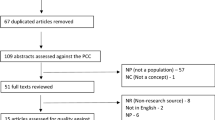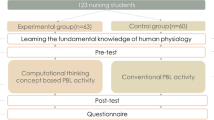Abstract
Integration of simulated practice with art-based teaching strategy can be effective for learning communication skills. This pilot study outlines the effect of integrating simulation with art-based teaching strategies on the attitudes of oncology fellows toward learning communication skills. The study was conducted in Iran using a quasi-experimental method. The participants were the oncology fellows of Tehran University of Medical Sciences (n = 19). The intervention was 1-day workshop, followed by integrating simulation with different types of art-based teaching methods. The Communication Skills Attitude Scale (CSAS) was used to assess the effectiveness of the developed model. Our finding indicated that the mean values of oncology fellows’ attitude scores in all domains of CSAS including importance in medical context (53.26 ± 2.13vs 41.00 ± 5.01, p = 0.001), excuse (25.84 ± 3.01vs14.36 ± 2.62, p = 0.001), learning (23.26 ± 1.40vs8.89 ± 2.25, p = 0.001), overconfidence (13.10 ± 1.44 vs 5.57 ± 1.38, p = 0.001), and overall (115.47 (5.51) vs 69.84(6.51) p = 0.001) increased significantly after the intervention as compared with before it. Findings support the hypothesis that using integrated training methods may help oncology fellows to appreciate the importance of communication skills learning. The implications of this hypothesis are that the inclusion of integrating simulation with art-based teaching strategies in the medical curriculum can improve the attitude of oncology fellows during their education.
Similar content being viewed by others
References
World Federation for Medical Education (WFME) (2015) Basic medical education. WFME global standards for quality improvement. The 2015 revision. Available: https://wfme.org/download/wfme-global-standards-for-quality-improvement-bme.Accessed 30June 2019
American Board of Medical Specialties (ABMS) (2014) Standards for the ABMS Program for Maintenance of Certification (MOC) Available: https://www.abms.org/media/1109/standards-for-the-abms-program-for-moc-final.pdf. Accessed 30 June 2019
Accreditation Council for Graduate Medical Education (ACGME) (2007) Common program requirements. Available:https://www.acgme.org/Portals/0/PFAssets/ProgramRequirements/CPRs_2017-07-01.pdf. Accessed 30 June 2019
General Medical Council (GMC) (2009) Tomorrow’s doctors. Outcomes and standards for undergraduate medical education. Available:https://www.gmc-uk.org/-/media/documents/somep-2014-final_pdf-58751753.pdf
Frank JR, Snell LS, Sherbino J, Al E (2014) The Draft CanMEDS 2015 Milestones guide – September 2014. Ottawa R Coll physicians SurgCanada.Ottawa. Available from: http://www.royalcollege.ca/rcsite/documents/canmeds/canmeds-2015-framework-series-3-e.pdf. Accessed 30 June 2019
Ullah MA, Barman A, Rahim AFA, Yusoff MSB (2012) Determinants of medical student attitudes to a learning communication skills teaching program. JOMH. 9(4):245–254
Arnold RM, Back AL, Barnato AE, Prendergast TJ, Emlet LL, Karpov I, White PH, Nelson JE (2015) The critical care communication project: improving fellows' communication skills. J Crit Care 30(2):250–254
Hope AA, Hsieh SJ, Howes JM, Keene AB, Fausto JA, Pinto PA, Gong MN (2015) Let’s talk critical. Development and evaluation of a communication skills training program for critical care fellows. Ann Am Thorac Soc 12(4):505–511
Kelley AS, Back AL, Arnold RM, Goldberg GR, Lim BB, Litrivis E et al (2012) Geritalk: communication skills training for geriatric and palliative medicine fellows. Ann Am Thorac Soc. 60(2):332–337
Roze Des Ordons AL, Doig CJ, Couillard P, Lord J (2017) From communication skills to skillful communication: a longitudinal integrated curriculum for critical care medicine fellows. Acad Med 92(4):501–505
Baile WF, De Panfilis L, Tanzi S, Moroni M, Walters R, Biasco G (2012) Using sociodrama and psychodrama to teach communication in end-of-life care. J Palliat Med 15(9):1006–1010
Epner DE, Baile WF (2014) Difficult conversations: teaching medical oncology trainees communication skills one hour at a time. Acad Med 89(4):578
Klugman CM, Peel J, Beckmann-Mendez D (2011) Art rounds: teaching interprofessional students visual thinking strategies at one school. Acad Med 86(10):1266–1271
Perry M, Maffulli N, Willson S, Morrissey D (2011) The effectiveness of arts-based interventions in medical education: a literature review. Med Educ 45(2):141–148
Finch A (2012) Attitude change through learning. Encyclopedia Sci Learn. https://doi.org/10.1007/1978-1001-4419-1428-1006_1631
Aryal B (2012) Attitude towards learning communication skills in medical students of Chitwan Medical College Chitwan Nepal. IJPBA.3 (5)
Bays AM, Engelberg RA, Back AL, Ford DW, Downey L, Shannon SE, Doorenbos AZ, Edlund B, Christianson P, Arnold RW, O'Connor K, Kross EK, Reinke LF, Cecere Feemster L, Fryer-Edwards K, Alexander SC, Tulsky JA, Curtis JR (2014) Interprofessional communication skills training for serious illness: evaluation of a small-group, simulated patient intervention. J Palliat Med 17(2):159–166
Cohen RA, Jackson VA, Norwich D, Schell JO, Schaefer K, Ship AN, Sullivan AM (2016) A nephrology fellows’ communication skills course: an educational quality improvement report. Am J Kidney Dis 68(2):203–211
McCallister JW, Gustin JL, Wells-Di Gregorio S, Way DP, Mastronarde JG (2015) Communication skills training curriculum for pulmonary and critical care fellows. Ann Am Thorac Soc 12(4):520–525
Ahn S, Yi YH, Ahn DS (2009) Developing a Korean communication skills attitude scale: comparing attitudes between Korea and the West. Med Educ 43(3):246–253
Anvik T, Gude T, Grimstad H, Baerheim A, Fasmer OB, Hjortdahl P, Holen A, Risberg T, Vaglum P (2007) Assessing medical students' attitudes towards learning communication skills–which components of attitudes do we measure? BMC Med Educ 7(1):4
Bombeke K, Van Roosbroeck S, De Winter B, Debaene L, Schol S, Van Hal G et al (2011) Medical students trained in communication skills show a decline in patient-centred attitudes: an observational study comparing two cohorts during clinical clerkships. Patient Educ Couns 84(3):310–318
Rees C, Sheard C (2003) Evaluating first-year medical students’ attitudes to learning communication skills before and after a communication skills course. Med Teach 25(3):302–307
Koponen J, Pyörälä E, Isotalus P (2012) Comparing three experiential learning methods and their effect on medical students’ attitudes to learning communication skills. Med Teach 34(3):198–207
Brown J (2010) Transferring clinical communication skills from the classroom to the clinical environment: perceptions of a group of medical students in the United Kingdom. Acad Med 85(6):1052–1059
Yakhforoshha A, Emami DSAH, Mohammadi N, Cheraghi M, Mojtahedzadeh R, Mahmoodi-Bakhtiari B et al (2017) Developing an integrated educational simulation model by considering art approach: teaching empathic communication skills. Eur J Pers Cent Healthc 5(1):154–165
Rees C, Sheard C, Davies S (2002) The development of a scale to measure medical students' attitudes towards communication skills learning: the communication skills attitude scale (CSAS). Med Educ 36(2):141–147
Yakhforoshha AMS, Naser Y, Amin G, Mohammadali C, Rita M, Behrooz M-B, Hossein ESA (2018) Psychometric properties of the communication skills attitude scale (CSAS) measure in a sample of Iranian medical students. J Adv Med Educ Prof 6(1):14–21
Christie D, Glew S (2017) A clinical review of communication training for haematologists and haemato-oncologists: a case of art versus science. Br J Haematol 178(1):11–19
Akasah ZA, Alias M (2010) Emphasizing learning of the affective domain for the realization of the engineering learning outcomes. Cognition 7:9
Wright KB, Bylund C, Ware J, Parker P, Query JL, Baile W (2006) Medical student attitudes toward communication skills training and knowledge of appropriate provider-patient communication: a comparison of first-year and fourth-year medical students. Med Educ Online 11(1):4594
McCroskey JC (1994) Assessment of affect toward communication and affect toward instruction in communication. In: Morreale S, Brooks M (eds) 1994 SCA summer conference proceedings and prepared remarks, 1994 August 4–7. Annandale (VA): Speech Communication Association, Alexandria, VA, pp 55–71
Anvik T, Grimstad H, Baerheim A, BerntFasmer O, Gude T, Hjortdahl P et al (2008) Medical students’ cognitive and affective attitudes towards learning and using communication skills–a nationwide cross-sectional study. Med Teach 30(3):272–279
Miller M (2005) Teaching and learning in affective domain. Emerging perspectives on learning, teaching, and technology. Retrieved March 6:2008
Rees C, Sheard C (2002) The relationship between medical students’ attitudes towards communication skills learning and their demographic and education-related characteristics. Med Educ 36(11):1017–1027
Berkhof M, van Rijssen HJ, Schellart AJ, Anema JR, van der Beek AJ (2011) Effective training strategies for teaching communication skills to physicians: an overview of systematic reviews. Patient Educ Couns 84(2):152–162
Author information
Authors and Affiliations
Corresponding author
Ethics declarations
The study was approved by the Ethics Committee at TUMS and registered at the Iranian Registry of Clinical Trials (ID: IRCT2016011626039N1).
Conflict of Interest
The authors declare that they have no conflict of interest.
Additional information
Publisher’s Note
Springer Nature remains neutral with regard to jurisdictional claims in published maps and institutional affiliations.
Rights and permissions
About this article
Cite this article
Emami, S.A.H., Shirazi, M. & Yakhforoshha, A. Effectiveness of Integrating Simulation with Art-Based Teaching on Attitudes of Oncology Fellows for Learning Communication Skills: a Pilot Study. J Canc Educ 36, 33–38 (2021). https://doi.org/10.1007/s13187-019-01594-3
Published:
Issue Date:
DOI: https://doi.org/10.1007/s13187-019-01594-3




